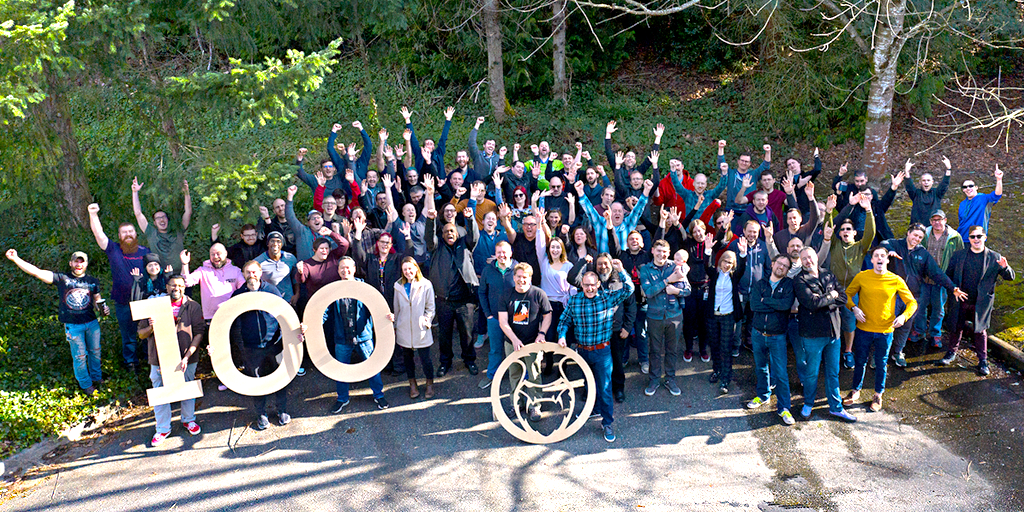
Last October, Bungie alum Harold Ryan revealed his new game development initiative, ProbablyMonsters.The Issaquah, WA-based company is not merely another game studio, but instead Ryan and his team have envisioned a new game development model that aims to build AAA studios from the ground up in a sustainable manner. Today, even as the world and the games industry grapples with an ongoing pandemic, ProbablyMonsters revealed that it’s passed the 100 employee mark, “the first of several planned growth milestones.”
ProbablyMonsters’ first two studios are making progress as well. Cauldron Studios, led by Dave Matthews (God of War, Myst) is working on a narrative-driven AAA game, while Firewalk Studios, led by Tony Hsu (Destiny, Call of Duty: Black Ops) is creating a multiplayer AAA game. Both teams are in “milestone development for their first projects, and both games have been separately signed with respective major publishers,” ProbablyMonsters announced.
In a press release, ProbablyMonsters boasted that it’s attracted top talent “from over 40 leading companies, 30 blockbuster game franchises, and top film and technology projects.” Ryan told GameDaily this week that his company has managed to bring in numerous veterans because of the people-first culture ProbablyMonsters has fostered and the track record that Ryan already has.

As Ryan remarked to GameDaily in October, “In one capacity or another, I led Bungie for 15 years, and we grew throughout that without layoffs. I was really proud of the stability of the company as we grew and moved forward.”
Sustainability is incredibly difficult to manage in the AAA games business, especially when team sizes can number in the hundreds. Ryan does believe that capping the headcount at individual ProbablyMonsters studios can go a long way towards addressing this.
“As we have grown to over 100 employees across our entire business, we still believe in keeping our individual ProbablyMonsters studio headcounts in the 120 maximum range. To me, that number is optimal for maintaining both our internal culture and communications as well as a sustainable and efficient development process for each of our studios,” he explained.
With ProbablyMonsters continuing to add more talent to its ranks, Ryan said it emboldens the team and reinforces that his vision for sustainability is resonating.
“This helps to validate that our mission, vision and strategy are working well. I’m especially proud to see how our culture has been upheld as we’ve hired from over 40 different companies, and have maintained an inclusive, diverse and positive environment here at ProbablyMonsters. It’s a busy time for us, and it’s only going to get more active as we continue to ramp up our efforts across all our teams,” he noted.
Ryan had previously suggested that a third game development studio is also underway, and while he had no new information on that team or its maiden project, he stressed that the strategy remains the same: it’s about the people and the culture.
“It’s important that growth plans are always focused first on people. As we consider building new ProbablyMonsters studios, we look for a creative vision that’s additive to our family of studios while fitting into our culture. Our goal is to make sure that our studios bring something new and make a positive impact across all of ProbablyMonsters,” he said.
Putting a priority on people is more important now than ever before, as so much of the industry has been turned upside down by the global pandemic. Unemployment has skyrocketed and anxiety has been running rampant for much of the population, game developers included (even if the games business is more resistant to economic downturn). This is where good leadership and the right company culture can make a huge difference in game developers’ lives.
“It’s certainly been a distressing time in our world and industry. The global pandemic has had a drastic impact on how we live and work, as it has for the entire industry. At this point we are operating 100% remotely with teams connecting and collaborating from their homes. We also communicated early on to our staff that their jobs were not in jeopardy and that we had reserves to carry us through these turbulent times,” Ryan stressed. “We want employees to be able to focus on taking care of themselves and their loved ones while making the transition with us. For us, it’s always been about how we’re building careers within ProbablyMonsters, and that means delivering on job stability and security especially during a crisis like this.”
It may be easier said than done for some game studios, but Ryan believes that the onus falls on game companies to rise up to the challenge at times like this and do everything within their power to fight for their employees’ livelihoods.
“My advice at all times is to let the company bear the brunt of any stress, pressure or risk and give teams the space needed to still do their work,” he noted. “We’ve still got a business to run, but it’s important to make sure we first take care of our people. We need to recognize their personal difficulties and complications such as family commitments and balancing parental responsibilities. We’ve been communicating with our staff to keep us posted on what they need to help make their remote situations work for them – both personally and professionally. This applies to either adapting their work schedules to help them balance their personal commitments, or helping to supply more resources and equipment for them and their families.”
Ryan added that he’s been communicating with his leadership team to outline exact steps for dealing with employees during the pandemic, including:
Aside from managing employees who are contending with the impact of the pandemic, Ryan reaffirmed that he’s encouraging the studios assembled within ProbablyMonsters to avoid crunch at all costs. As a AAA veteran, Ryan is intimately familiar with how harsh the conditions can get if production is not managed properly. Over the last couple years in this industry, we’ve seen some of the best studios in the world (Rockstar, Naughty Dog, CD Projekt Red, id Software, etc.) admit that crunch reared its ugly head. It doesn’t have to be this way, however.
“I believe that it’s important to have a balanced plan that focuses on peoples’ lives and careers first. Once that is accomplished, team leads can then plan the company business around the needs of each team,” Ryan commented. “The line between work and crunch is different for everyone. Each situation is different, and team leads have to be aware of what works for each of their teammates. One of the key value propositions at ProbablyMonsters is to provide a solid foundation of business stability to keep crunch from being any part of the business plan.
“Providing sufficient resources and time to make a AAA game with a planned workload is a key element of our leadership experience. This isn’t our first rodeo. We also have a unique structure that allows ProbablyMonsters studios to focus on the games they are making, while the ProbablyMonsters platform team handles everything else. This reduces the pressure on our development teams. By allowing each side to do what they’re best at, it allows for a stronger model where we can create great games made by great studios.”
Large independent studios have become a rarity in the games industry. With Microsoft snatching up teams like inXile, Obsidian, Double Fine, Ninja Theory, and others, and Sony just last year tying the knot with Insomniac, there are now just a handful of actual AAA indies remaining. So what happens when ProbablyMonsters’ Cauldron Studios or Firewalk Studios sees its first major success and draws the eyes of behemoths like Microsoft, Sony, or Google? Is Ryan intent on maintaining independence for his studios or would he be amenable to his babies flying the coop? At this point, it may be too early to say, but Ryan seems flexible and wants to ensure that individual studios retain the freedom to do what is best for them.
“The way I formed ProbablyMonsters allows each of our studios to have flexibility and stability. Our continued mission is to unite, guide and empower talented developers and teams. We work to build and foster a positive culture that supports long lasting, stable game studios. I respect that different ProbablyMonsters studios may take a different path toward those goals and we have an open line of communications with the leadership teams to make the best decisions for their studios, respectively,” he answered.
Release timeframes for the very first projects from Firewalk, Cauldron and a yet-to-be-named third studio are not set, but with next-gen consoles coming out this holiday season, it’s clear that these teams will be harnessing the new technology to make something compelling. Ryan has been through numerous console transitions throughout his career, and the leaps that each new generation brings are always tantalizing for creatives who suddenly have a wider canvas to paint on.
“Every new generation of consoles brings new opportunities for players, which is exciting for us as game makers. The upcoming consoles are bringing increased fidelity, decreased load times and richer immersive simulations, all of which are a rich playground for game developers to bring new worlds and characters to life. It allows for deeper experiences including richer storytelling opportunities,” Ryan noted. “Connectivity in gaming will be even more important in the future and I feel that each of these platforms will continue pushing forward in that regard. We’ve been in contact with all the platform teams, including emerging platforms, and are always keeping new technology in mind.”
Speaking of emerging platforms, for the first time in the industry’s history, cloud gaming is a legitimate option for developers to consider. While the cloud gaming sector is still quite nascent, the heavyweights are investing quite a bit into the infrastructure and the content to support a vibrant ecosystem. Google Stadia, Microsoft’s xCloud or some other cloud service will no doubt be vying for the new games that ProbablyMonsters ultimately releases.
“Where there’s sufficient infrastructure to support it, cloud gaming is a great harbinger of the increased ability for a global audience to connect and participate in interactive entertainment,” Ryan said. “Latency can still be an issue and big files can create long wait times, but there have been many improvements in these areas. We’re in favor of lowering barriers between gamers, game developers and the services that keep them playing, and we’re excited to see more diverse options for play come online. ProbablyMonsters is setting itself up to serve the needs of the future generation of gamers, so it’s important for us to stay focused on how our AAA games are best served.”
As ProbablyMonsters grows, it’s easy to envision the company leveraging its talent and connections to the film and TV industries to create transmedia IP. Some of the talent currently at ProbablyMonsters has worked on huge franchises like Kung Fu Panda, Transformers, Jurassic Park, Toy Story, Ice Age, and more. Any extension of an IP into other media is a far off goal, however.
“For ProbablyMonsters, games are our first and main focus as that’s our core passion and experience. Franchises and transmedia are always a part of our planning, but creating AAA games that resonate with players is definitely our first priority right now. If you don’t create a great game experience for players first, the rest won’t be as important,” Ryan added.
As with any game company, success for ProbablyMonsters will ultimately be judged by the quality of content produced. That first test will come once Firewalk or Cauldron launch their new games. But there’s another kind of success that isn’t measured by game reviews or sales, and that’s one guided by company culture. On that metric, ProbablyMonsters already seems to be ahead of the pack.
 GameDaily.biz © 2026 | All Rights Reserved.
GameDaily.biz © 2026 | All Rights Reserved.